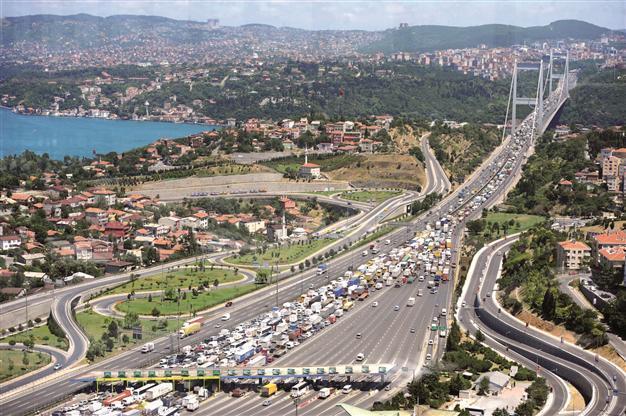Arab countries interested in Turkish privatization agenda
ISTANBUL - Anatolia News Agency

Automobiles line up at the toll booths of the Fatih Sultan Mehmet Bridge in Istanbul. Turkey’s Arab neighbors are interested in the privatization of Turkey’s highways and bridges, including Fatih. Daily News Photo by Emrah Güler
Turkey’s neighbors are interested in the privatization of Turkey’s highways and bridges as Turkey increases trade ties with the region, said Turkey’s Privatization Administration President Ahmet Aksu at the 7th Turkish Arab Economic Forum over the weekend.Aksu said Turkey’s geopolitical location made it especially attractive for investments and opportunities. Currently, there are 12 companies on Turkey’s privatization roster, according to Aksu. These include banking, telecommunications, electricity production and distribution, and natural gas distribution companies, as well as sugar factories and marinas.
“As part of our privatization projects, Saudi Oger Group has purchased Turk Telekom. ... Now after a long preparation period, there are six highways, two bridges and arteries that connect these highways, up for privatization.” Aksu added that the tender for these privatizations would take place before the end of October.
Among other important privatization projects are the İzmir Marina and a geothermal energy privatization project, which Aksu expects will be open to privatization by the third quarter of this year.
Stock exchange integration
Istanbul Stock Exchange President İbrahim Turan, who also spoke at the forum, said that there were plans to integrate the Istanbul Stock Exchange with neighbor stock exchanges.
“The Istanbul Stock Exchange (İMKB) is the region’s largest and most developed stock exchange. When we look at the market’s capital, it is more than $220 billion and comprises 26 percent of Turkey’s GDP,” said Turan.
Deals with foreign bourses
According to Turan, the İMKB 100 Index have performed better than the world’s developed economies.
“We are participating in the region’s stock exchanges. In the future this list is going to become even longer. We are looking for opportunities to expand our partnerships,” said Turan, noting that Turkey had signed agreements with the Macedonian, Casablanca, Kazakhstan, Egyptian and South Korean stock exchanges.
Qatar’s Finance Minister Yousef Hussein Kamal, one of the participants in the forum, said Qatar planned to increase its relations with Turkey over the next 10 years and that they were working on a $3 billion investment package for Turkey. He also said there were 30,000 foreign firms currently investing in Turkey, but that very few of them were Arab firms. He invited Arab firms to increase their investments in Turkey.
Turkey’s Finance Minister Mehmet Şimşek expressed similar sentiments at the wrap-up of the forum.
“Turkey is becoming an economic and financial center. Arab countries can play an important role here not just with Turkey, but with other neighboring countries through the facilitation of Turkey,” he said.
“The past 10 years were very fruitful and exciting in terms of Turkish-Arab relations. And the relations will improve significantly within the next decade,” Şimşek said. He added that Turkey was “very much excited” about the Arab Spring, which he said would bring more stability in the medium and long term despite some immediate uncertainties and damage.
Stars appear at reception
“The transition period needs to be managed well in meeting expectations, maintaining the rule of law and in protection of the territorial integrity of all the countries involved. The driving force of change should be the people,” Şimşek said.
Turkish actors and actresses including Halit Ergenç, Murat Yıldırım, Bergüzel Korel and Selma Ergeç, who star at a number Turkish TV series also popular in Arab countries, participated in the closing reception hosted by Şimşek.
















